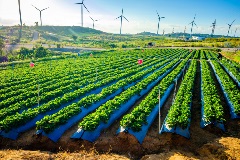10 for 2021: Investing in the Circular Economy
This report aims to support investors interested in gauging environmental, social and governance (ESG) risks and opportunities in the global food value chain. We survey key subindustries – from agrochemicals, agriculture and aquaculture to packaged food, food retail and restaurants – in search of solutions that may support the principles of the circular economy (CE). These principles include minimizing waste and pollution, extending the use-phase of products and ecosystem regeneration. Some of the key insights found in the report are:
Lessons Learned from 926 Engagement Meetings in Emerging Markets
When Sustainalytics (GES[1]) initiated the Emerging Markets (EM) Engagement program as a pilot project in 2009, the scale, scope and impact were undetermined factors. Based on the successful execution of the program methodology in the African and Middle Eastern regions during the pilot stage, the full program launched in 2010 to cover all major emerging markets. After the project close in July 2020, the program accounts for 926 meetings with companies in emerging markets.
A Political Pivot for Climate Change and the American Coal Industry
As the Biden administration moves into the White House this week, the world is waiting to see if a promising focus on climate change along with a Democratic Congress will present plausible opportunities to cut carbon emissions. While the outgoing administration backed initiatives supporting coal energy[1], it doesn’t appear to have slowed industry decline.
Is Natural Gas a Cleaner Energy Solution?
While Oil and Gas (O&G) operations are responsible for roughly 15 percent of global energy-related GHG emissions, some energy companies have pledged the role of natural gas (NG) as a transitional fuel. At the same time, NG energy use is increasing globally, and shale-gas extraction is booming at an unprecedented rate. One factor that is often overlooked is the methane emissions across the NG value chain.
Combining ESG Risk and Economic Moat
In this report, we look at the potential synergies between Sustainalytics’ ESG Risk Ratings and Morningstar’s Economic Moat Rating. As a part of our research, we constructed a back-testable investment strategy and portfolio by segmenting stocks with low ESG risk and a wide moat. While both metrics worked independently, they performed exceptionally well in combination.
Integrating Climate Risk into Corporate Governance
Since the introduction of the Taskforce on Climate-related Financial Disclosures (TCFD), there has been increased scrutiny of corporate climate governance and broader associated risks. Investors have increased their focus on climate risk, as governance mechanisms are likely to be impacted by transition and physical risk challenges[i].
How Climate Gentrification is Increasing Real Estate Costs and Socio-economic Disparities
Climate gentrification is an emerging concept describing how land with greater resiliency against intensifying physical impacts of climate change becomes more desirable and valuable.[1] It catalyzes fast and visible socio-economic transformation in communities.
ESG Risk Ratings Methodology
The ESG Risk Ratings measure the degree to which a company’s economic value is at risk driven by ESG factors or, more technically speaking, the magnitude of a company’s unmanaged ESG risks. A company’s ESG Risk Rating is comprised of a quantitative score and a risk category.
Prioritizing Patient Care and Staff Safety in a Pandemic
Medical facilities, including hospitals and long-term care facilities, are under tremendous pressure to provide quality healthcare for patients while ensuring patient and staff safety amidst the COVID-19 pandemic. By using Sustainalytics’ ESG Risk Rating to understand better the risks faced by companies, and the current state of preparedness within the medical facility subindustry, investors can identify the most relevant points to address when engaging with companies and analyzing potential ESG impacts in their portfolios.
Sustainable Finance Disclosure Regulation: An Industry Game-changer
In recent months, the Sustainable Finance Disclosure Regulation (SFDR) has been sparking almost as much debate as the EU Taxonomy – both cornerstone regulations of the EU Sustainable Finance Action Plan. With the SFDR set to redefine ESG disclosures and make a significant impact on financial market participants in Europe, the short timeline and ambiguity on several vital details are creating confusion and concern in the industry. The risk of organizations not being able to comply in time is still present, despite the announced delay in timelines for the technical standards, as is the risk of high financial and operational costs for the industry.
Corporate ESG Ratings: How businesses are leveraging their ESG Risk Ratings
Good environmental, social and governance (ESG) performance is not just about meeting investor demands. From revenue generation and raising capital to talent acquisition and employee retention, strong corporate ESG performance can influence key aspects of a company’s operations.
A Pipeline for Strategic ESG Risk Mitigation
Given the ESG impacts often associated pipeline projects, it is reasonable to say that pipelines have been a source of controversy in North America and around the world. In 2020 alone, several major pipeline projects face high levels of public and community-based opposition; with consequences including widespread protests (as was the case for TC Energy’s Coastal GasLink project at the beginning of this year) and large-scale regulatory and legal challenges (as seen currently with the Dakota Access Pipeline).
If the proxy vote is your voice, what are you saying?
To date, 2020 has marked record inflows to sustainable investments[1]. Elevated globally by a health, social and financial crisis; investors and stakeholders alike are coming to understand the inherent risk of ignoring key environmental, social and governance factors. Current events coupled with new regulations and stakeholder pressure are creating the need for investors to demonstrate their commitment as responsible owners who view corporate accountability as a means to achieving greater long-term value.
ESG Innovators in the ever-changing world of investment solutions
NN Investment Partners (NN IP) is the asset manager of NN Group N.V., a publicly traded corporation, headquartered in The Hague, the Netherlands. NN Investment Partners offers specialized SRI funds and tailor-made responsible investment solutions that meet the growing demand for products that generate good financial returns and at the same time have positive impact on society.
The Real Price of Food
Today, October 16, is World Food Day, a campaign created in 1981 to raise awareness of hunger and poverty. With an estimated nine percent of the global population reported as undernourished in 2019, hunger and poverty remain a reality for millions of people with the situation being exacerbated by the COVID-19 pandemic.[1],[2]
Untangling the Complex Threads of Modern Slavery
October 7 is World Cotton Day–an annual event created in 2019 after four cotton-producing countries (Benin, Burkina Faso, Chad and Mali) applied to the UN for special recognition of the crop. Cotton has much to celebrate–it is the primary source of livelihoods and revenue for up to a billion people. That said, the positive benefits do not extend to everyone in the value chain, as significant human rights challenges have persisted in many countries. Change, however, may be upon us. Cotton could be set to face major dislocations driven by responses to human rights violations, with significant implications for investors.
ESG at a Reasonable Price in China
Over the last decade, portfolio managers worldwide have been increasingly convinced that incorporating environmental, social, and governance (ESG) criteria into investment decisions could provide better risk-adjusted returns. As a result, responsible investing, has moved from a niche activity to the mainstream. As more capital shifts to ESG products, there have been discussions regarding the risk of an ESG bubble as stocks with good ESG scores have enjoyed price appreciation and sometimes go beyond fundamentals[i].



















